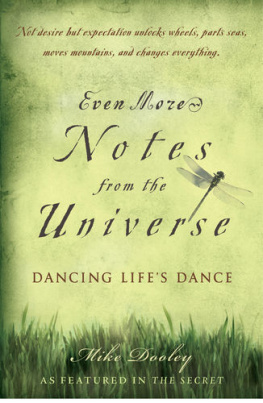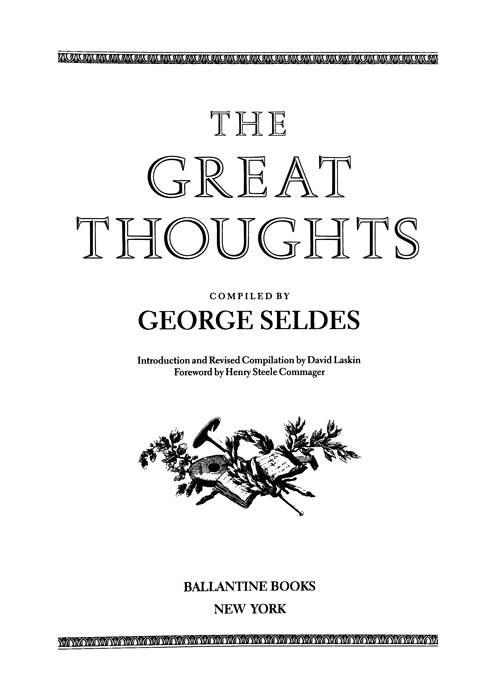Also by George Seldes
The Great Quotations
Witness to a Century
A Ballantine Book
Published by The Ballantine Publishing Group
Introduction and new compilation copyright 1996 by David Laskin
Copyright 1985 by George Seldes
Foreword copyright 1985 by Henry Steele Commager
All rights reserved under International and Pan-American Copyright Conventions. Published in the United States by Ballantine Books, a division of Random House, Inc., New York, and simultaneously in Canada by Random House of Canada Limited, Toronto.
This is a revised edition of a work originally published by Ballantine Books, a division of Random House, Inc., in 1985.
Owing to limitations of space, permission acknowledgments can be found , which constitute an extension of this copyright page.
Ballantine and colophon are registered trademarks of Random House, Inc.
www.ballantinebooks.com
Library of Congress Catalog Card Number: 96-096051
eISBN: 978-0-307-77560-3
v3.1

This book is dedicated to the memory of my wife, Helen Larkin Seldes, who helped me for many years gather and evaluate the great thoughts which rule the world; and to my neighbor Edna Belisle, the Woodstock Ambulance, and Dr. Hugh P. Hermann, who together saved me from death one morning, when the final draft was only half completed
And to twenty-six friends, my neighbors in Hartland and nearby towns who make living here possible, and to whom I have dedicated my birthday parties ever since I was ninety.
And to everyone who made publication possible, including editors Jolle Delbourgo and Elizabeth Sacksteder at Ballantine Books, and Mary Lee Coughlin, who struggled with every one of the thousands of paragraphs for many months, until The Great Thoughts achieved its final form.
George Seldes
Hartland-4-Corners, Vermont

CONTENTS

FOREWORD
Because Americans have had, from the beginning, a free press, we have had a longer tradition of the congenital nay-sayer, the contrary-minded, and the come-outer than most other nations. That tradition began with Common Sense; and with The Crisis (written as a series of newspaper articles). It was continued by William Lloyd Garrison and his anti-slavery Liberator, which insured that he would be heard; by Theodore Parker, the Great American Preacher, who dissented from the Dissenters and preached to the largest congregation in the country; and by Frederick Douglass, who published his own paper to carry on the work that Parker left unfinished. In the next century the tradition was carried on by Bryan, whose Commoner was his private organ; by Fighting Bob LaFollette, who gave his Weekly his own name; by William Allen White, who made his Emporia Gazette a national newspaper; and by I.F. Stone, whose Weekly Newsletter is alas no more with us.
It is to this tradition that George Seldes belongs. He had, from the beginningthat was way back in the first decade of this centurythe right credentials. His father had set an example: a failed pharmacist, he was not at all a failed radical, what with his admiration for Tolstoy and Kropotkin and Thoreau, and for Henry George, whose name his own son bore (the son was forced by his Chicago Tribune service chief to drop the Henry). Young George blundered into journalism, as it were. He was the star reporter for the Pittsburg Post and the Chicago Tribune, then a member of Pershings press corps of war correspondents, eventually becoming head of the Tribune bureau in Rome and Berlin. As a correspondent he discovered a knackalmost a geniusfor being there at the right time. He was there in Lenins Moscow, there in Mussolinis Rome, there in Hitlers Berlin, there when the French stormed Damascus, there when Franco conquered Spain; sooner or later he met almost everyone and took their measureusually one that fitted a bit tightly.
But twenty years of journalism disillusioned himnot with life, not with the American people, but with journalismall except his own. So, in 1940could he have picked a worse time?he launched his own private newsletter, called quite simply In fact. Ever sanguine, he hoped to reach a million readersworking people, mostly, and intellectuals. That hope was doomed, but in fact In fact did pretty wellnot far from two hundred thousand, which was more than all the major liberal weeklies combined. The time was not, after all, propitious for either independence or candor.
From the beginning, Seldes boasted that he belonged to no party, no organization, no group, society, or faction. He might have added to no nation, for with Tom Paine he could say, My country is mankind. Better yet, he might have said with Paine that while moderation in temper is always a virtue, moderation in principle is always a vice. The accuracy of that depends, to be sure, upon the principle. In Seldess case the principle was quite simply that the truth shall make men free.
After the war Seldes returned to his home in Vermont, where he could cultivate his garden and at the same time cultivate philosophy. Out of that retreat came, some twenty years ago, his compendium of Great Quotations. Since then he has been collecting andwe may be sureassimilating Great Thoughts.
The Great Thoughts is a tribute not only to those thinkers who have influenced George Seldes, but to Seldes himself, who lived with them and by them, who has found them comforting, stimulating, and challenging. Clearly it is his hope that they will serve this purpose for others.
Henry Steele Commager
Amherst, Massachusetts
December 1984

INTRODUCTION
Great men are they who see that spiritual is stronger than any material force, that thoughts rule the world.
Emerson, Progress of Culture
No one, so far as I know, has ever challenged the Rev. Mr. Ralph Waldo Emersons impressive dictum. The philosopher-king Marcus Aurelius Antoninus (120180 A.D .) believed that the universe is change, and that our life is what our thoughts make it. Paracelsus (14931541) wrote that thoughts are free and are subject to no rule. On them rests the freedom of man, and they tower above the light of naturecreate a new heaven, a new firmament, a new source of energy from which new arts flow. In the seventeenth century the French mathematicianphilosopher Blaise Pascal (who indeed may have influenced Mr. Emerson) wrote that mans greatness lies in the power of thought, and in my own lifetime the English mathematician-philosopher Bertrand Russell, whom I once met, confirmed these views on my present subject:











